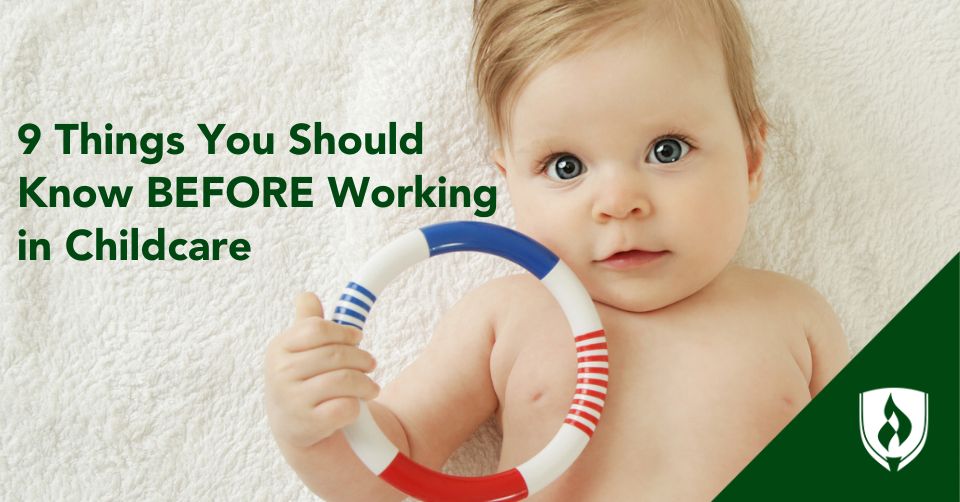
For some, there are no other occupations as enjoyable as being a child care worker. Playing games, reading books, singing songs and planning other fun activities makes working with children sound like a dream job, doesn’t it?
“We get joy from watching a child learn a new skill for the first time. We feel proud when a child says to us, ‘Look what I can do!’ It makes us happy that children are learning, and this new knowledge is because of our time spent with them,” says Rasmussen Early Education Instructor, Dr. Deidra Boodoo.
Of course, providing quality care for kids still has its challenges. Children have diverse needs, and families depend on childcare providers to understand how to best meet them.
Unsurprisingly, then, child care workers are indispensable to the communities they serve. So, if you’re looking for a career that allows you to help others – and have some fun while doing it – here’s what you need to know.
9 Things to know about working in childcare
1. Childcare workers do much more than babysit
There’s a bit of a misconception that childcare workers “just watch kids all day.” But that couldn’t be further from the truth, says Rasmussen School of Education Instructor, Joni Kuhn.
Working in childcare involves a lot more than just keeping children occupied. Early childhood is when kids begin to develop key social skills. As a childcare worker, you’ll engage babies and toddlers in different activities that help foster their language and communication skills, for example.
“If you sing in the choir, don’t stop singing! Educators spend a good chunk of time singing to the children at nap time and diaper changing time during large group time all day – every day!” says Boodoo. The benefits of music in early childhood education can't be overstated.
Childcare providers also help parents and families recognize potential emotional and/or developmental problems, according to the Bureau of Labor Statistics (BLS).1 Additionally, the BLS reports that working in early childhood education involves keeping detailed records of each child’s progress, routines and interests.
2. Childcare workers need to be flexible
Working with children of such young ages requires empathy, problem-solving skills—and flexibility. Kids in childcare and preschool education programs can experience a bit of a culture shock as they adjust to spending time away from their families.
“Working with each age group provides a different experience for the childcare worker. For example, when working with infants, educators must be mindful of how they hold and care for them,” Boodoo says. “Infants and toddlers are also on an individual schedule, so infant bottle feeding and individualized care are needed.”
Plus, the classroom environment introduces structure into a child’s life, which can, understandably, take some getting used to. Not to mention the fact that babies and toddlers naturally throw the occasional tantrum and can therefore easily disrupt lessons and activities.
“People need to be able to follow the children’s lead a lot of the time, so being able to let go of strictness and control with children, in the moment, is an excellent skill to have,” says Kuhn.
3. Childcare work is teamwork
As a child care worker, you’ll put your interpersonal skills to the test. But you’ll also have the support of your colleagues as you navigate this exciting career path.
“Childcare center workers work in facilities that include programs offering Head Start and Early Head Start. They often take a team-based approach and may work with preschool teachers and teacher assistants to teach children through a structured curriculum,” states the BLS.
4. It’s never too soon to educate children
When you think about it, there’s a simple reason why education and child care have become intertwined in our culture: Children’s developing brains need stimulation to help them learn and grasp new concepts.
And when it comes to early childhood education, teaching and learning can take many forms. For example, even playing helps children develop new skills during those critical early years from birth through toddlerhood.
But childcare providers can even educate kids who are too young to play on their own. As Kuhn points out, newborns and infants may not be able to speak yet, but they can still learn a lot from classroom teachers.
“The more we talk with them, the better their social skills and language will be,” she says.
Kuhn shares some examples of ways to engage an infant’s young mind:
“Things like telling them, ‘You have blue eyes,’ and then pointing to their eyes – or reading to them, even if they can’t understand the language – help them with tone of voice and patterns. They will pick up more easily on letter and word sounds later,” she explains.
5. Toddlers learn by doing
“Working with toddlers, depending on their developmental levels, lends itself to clapping patterns and having the children try to copy us,” says Kuhn. “They understand more than infants, so we can have them help to pick up.”
As she mentions, toddlers can easily get distracted, especially when they’re supposed to be doing chores. “It’s important to know that this is very typical and expected behavior, so we would not get mad at the child.”
She adds, “This phase/age is one in which we introduce things to children: Can you help me clean up? Can you put your cup away? Can you turn the light off for me? Can you hand me that wet washcloth?”
6. Childcare careers include full-time and part-time positions
According to the BLS, many child care workers have part-time roles. But if you’re looking for full-time opportunities, you can also find a fulfilling career as a childcare provider.
As the agency explains, childcare centers typically have long hours, so families can drop off and pick up their children on their way to and from work every day. Some centers also stagger shifts between full-time and part-time childcare workers to maximize coverage.2
7. Working in childcare can be physically demanding
There’s no denying that being a childcare worker calls for serious physical stamina. Working with children means chasing after them, cleaning up messes and getting down on the floor for playtime.
At the same time, childcare workers don’t have the luxury of being squeamish. Not every child will be potty trained yet, and kids will inevitably have accidents.
Some states also require child care workers to obtain certifications in cardiopulmonary resuscitation (CPR) and first aid, as the BLS notes. 3 So, physical strength is an absolute must when you’re working with children ages eight and under.
8. Working with children means working with their parents and families, too
Parents and families haven’t all studied child development. As a childcare provider, you will not only educate the children in your classroom, but also the family members they live with.
For instance, parents and guardians may have questions about whether certain types of behavior are normal for certain age groups. They may also seek your advice for navigating difficult situations, like moving to a new neighborhood or grieving the loss of a loved one.
Moreover, you’ll need to communicate with parents and families about any behavioral issues you identify among the children you care for.
Working with families might sound intimidating, but establishing strong relationships with them helps everyone in the end.
9. Working with children is even more fulfilling than you can imagine
“It is a beautiful thing to see a child experience the world for the first time. We in early education are sometimes the first to see a child take a few steps or say a few words,” says Dr. Boodoo. “These are proud moments for an early educator, knowing we had a part in influencing the next generation.”
Childcare providers are becoming integral to modern families and our society overall. In fact, recent data from the First Five Years Fund (FFYF) shows that 65% of children under age 5 in the U.S. have all available parents in the workforce.4
Child care workers, as a result, will have a significant influence on future generations. Families, communities and our entire society depend on these professionals to help support children’s learning and growth.
“Understanding children and how they develop has helped me to have a lot of success with educating children and encouraging positive behavior. It’s rewarding to be a person who can relate to and respect children, above all else,” says Kuhn.
What does a career path for a child care worker look like?
Whether your goal is to work with babies, toddlers or school-aged children, a career as a childcare provider could certainly be worth considering. There are many job titles related to childcare and non-public school settings, including:
- Early Childhood Teacher’s Aide
- Childcare Worker
- Early Childhood Teacher (in private childcare settings)
- Teacher’s Assistant
- Early Childhood Special Education Assistant
- Head Start Teacher
The level of education and/or work experience requirements will vary by specific job title, state regulations, and employer requirements. It is important to understand all of the standards by consulting the appropriate state and school/facility requirements. Still, many states require the Child Development Associate® (CDA®) credential, according to the BLS.3
Is working in child care right for you?
By now, you have a pretty solid idea of what it’s like to be a childcare worker. If you’re ready to follow your passion and prepare for a role in child care, Rasmussen offers online early childhood education (ECE) programs. Students of these programs can complete their Associate’s or Bachelor’s degrees in as few as 18 months.5
And if you still have questions, check out What Can I Do with an Early Childhood Education Degree?
The Early Childhood Education programs at Rasmussen University are not designed to meet, and do not meet, the educational requirements for licensure to teach in public preschools, or kindergarten, elementary or secondary schools in any state. The Rasmussen University Early Childhood Education programs are not approved by any state agency that licenses teachers. Before enrolling, it is important to understand all of the licensure eligibility standards for a desired career by consulting the appropriate state and school/facility requirements.
Child Development Associate® and CDA® are registered trademarks of Council for Professional Recognition.
1Bureau of Labor Statistics, U.S. Department of Labor, Occupational Outlook Handbook, Childcare Workers, Childcare Workers : Occupational Outlook Handbook: : U.S. Bureau of Labor Statistics ,(visited April, 18, 2025). Employment conditions in your area may vary.
2Bureau of Labor Statistics, U.S. Department of Labor, Occupational Outlook Handbook, Childcare Workers, Childcare Workers : Occupational Outlook Handbook: : U.S. Bureau of Labor Statistics ,(visited April, 18, 2025). Employment conditions in your area may vary.
3Bureau of Labor Statistics, U.S. Department of Labor, Occupational Outlook Handbook, Childcare Workers, Childcare Workers : Occupational Outlook Handbook: : U.S. Bureau of Labor Statistics ,(visited April, 18, 2025). Employment conditions in your area may vary.
42024 Child Care and Early Learning State Fact Sheets (July, 2024). First Five Years Fund. https://www.ffyf.org/resources/2024/07/2024factsheets/
5Completion time is dependent on transfer credits accepted and the number of courses completed each term.




